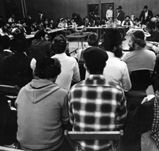Home
Letters
Article
Pictures
Soul Meetings
About
Contact
Search

Learning
the
meaning of faith

By IRVING SPIEGEL
"Intellectual curiosity brought me here and I leave intellectually and emotionally involved after my first experience with living Judaism," remarked 19- year-old Jeff Marx.
Jeff is a junior at
Washington University, St. Louis, and a resident of Chicago. Like most
of the 300 other students who spent a week here as guests of Hasidic families
in the Crown Heights section of Brooklyn, he had little knowledge of Judaism
or Jewish culture.
The students came from campuses in the United States and Canada to stay
with followers of Rabbi Menachem M. Schneerson, the spiritual leader of
the Orthodox Lubavitcher movement.
Invitations had been extended to Jewish college youths through the Hillel
Foundations of B'nai B'rith and other sources.
Visitors Join in Worship
During the week, the young people worshiped with their hosts, observed the Sabbath, learned the meaning of the Mitzvoth (religious commandments), and enjoyed the "farbrengen" (get together), with Rabbi Schneerson at 770 Eastern Parkway, the focal point of the worldwide Lubavitcher movement.
William Klein, a 23-year-old graduate student at Cornell University, said he had visited the Lubavitch headquarters on previous occasions.
"When I have
a low spiritual drag," he said. "I come here. I learn. I'm motivated
to do Mitzvoth."
On this Occasion, William had an opportunity to hear a favorite teacher.
Dr. Irving Block, a professor of philosophy at Western Ontario University,
a follower of the Lubavitcher movement.
"I heard him talk and draw for my satisfaction the distinction between pure knowledge for its own sake and the motivation toward religious commitment," Mr. Klein said.
In the library study of Rabbi Yehuda Krinsky, a member of the Lubavitcher movement's executive staff, 21-year-old Lee Skully of Cleveland State University remarked: "I am beginning to learn the meaning of Jewish identity."
A Meaning of Faith
Smiling with approval, Rabbi Krinsky remarked, "If we have implanted the meaning of Torah, what Judaism means into our young guests, we are happy. By and large these youngsters have been alienated from families, religious institutions, they are simply illiterate about their faith."
At this point, Rabbi Zelman I. Posner, a leader in the movement, and a lecturer on the Lubavitch philosophies, said: "They have a right to question things they do not understand. They asked questions. We respected those questions. Their reactions to our answers were a thoughtful nod. We feel we have accomplished much."
One student, who does not understand Yiddish, had his own translator along to take notes.
Basically, the Lubavitcher movement is an intellectual one, founded in the eighteenth century by Rabbi Schneur Zalman. The word, "chabad," is an acrostic for the three general segments of the intellect, namely, chochma (wisdom), bina (knowledge) and daat (understanding). Its term was created by the founder of the s movement and has become synonymous with Lubavitch.
The movement derives its name from the Russian town of Lubavitch where the movement was established. Rabbi Schneerson is a direct descendant of the founder.
(Source: NYT, January 2, 1973)

Every student receives personal attention during the encounters
Photos: by Shmuel Rivkin. Courtesy of LYO archives.
additions please E-mail us